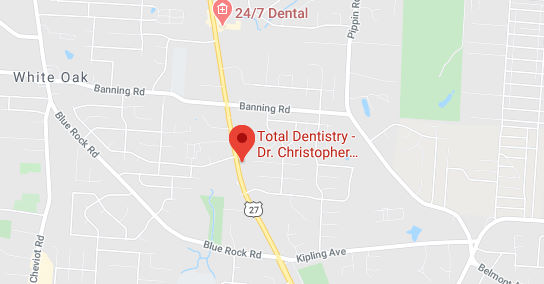Periodontal Treatment
What you don’t know can hurt you!
It is estimated that nearly 80 percent of the adult population has some form of gum disease. Often people have no idea they even have the disease because it doesn’t cause them pain. This is why we always perform a periodontal (gum) exam on all our new patients and, since periodontal disease can develop at anytime, continue to examine for periodontal disease once a year.
Total Dentistry offers non-surgical gum treatment that is often times very effective at improving the condition and controlling the disease. For the most advanced cases of periodontal disease, patients may be referred to a gum specialist (Periodontist).
What is gum disease?
Gum disease is an infection of the tissues that hold your teeth in place. It’s typically caused by poor brushing and flossing habits that allow plaque—a sticky film of bacteria—to build up on the teeth and harden. In advanced stages, periodontal disease can lead to sore, bleeding gums; painful chewing problems; and even tooth loss.
Gum Disease Can Be Prevented
The easiest thing to do is to prevent gum disease from ever forming with good oral health practices including brushing and flossing at home and having professional cleanings twice a year. However, if gum disease is present, the sooner it is treated, the better.
Some Of The Warning Signs Of Gum Disease Are:
The Stages of Gum Disease
Gum disease has several different stages, each progressing to more serious consequences. It starts as gingivitis, which is where plaque along the gumline begins to inflame the gums. This stage is easily treated and curable. If gingivitis is not treated, it will progress and lead to more advanced stages of periodontitis. Periodontitis is when further inflammation of the gums occurs and pockets begin to form around the teeth that are filled with plaque, tartar and food debris. This painless infection results in damage
to the bone (socket) supporting the teeth. Further advancement of the disease leads to tooth loss.
Gum Disease Can Affect Your Overall Health
In the past, many people haven’t taken this disease seriously. After all, it doesn’t hurt and many adults have it, right? Luckily the word is getting out about how gum disease affects a persons overall health. Periodontal disease leads to inflammation of the gums. This inflammatory bacteria then enters your bloodstream and travels throughout your body. Researchers have linked this process to a number of serious medical conditions. Consider this: (Information compiled from the American Academy of Periodontology, www.perio.org)
Diabetes
Diabetic patients are more likely to develop periodontal disease, which in turn can increase blood sugar and diabetic complications.
Heart Disease
Several studies have shown that periodontal disease is associated with heart disease. While a cause-and-effect relationship has not yet been proven, research has indicated that periodontal disease increases the risk of heart disease.
Stroke
Additional studies have pointed to a relationship between periodontal disease and stroke. In one study that looked at the causal relationship of oral infection as a risk factor for stroke, people diagnosed with acute cerebrovascular ischemia were found more likely to have an oral infection when compared to those in the control group.
Osteoporosis
Researchers have suggested that a link between osteoporosis and bone loss in the jaw. Studies suggest that osteoporosis may lead to tooth loss because the density of the bone that supports the teeth may be decreased, which means the teeth no longer have a solid foundation.
Respiratory Disease
Research has found that bacteria that grow in the oral cavity can be aspirated into the lungs to cause respiratory diseases such as pneumonia, especially in people with periodontal disease.
Cancer
Researchers found that men with gum disease were 49% more likely to develop kidney cancer, 54% more likely to develop pancreatic cancer, and 30% more likely to develop blood cancers.

